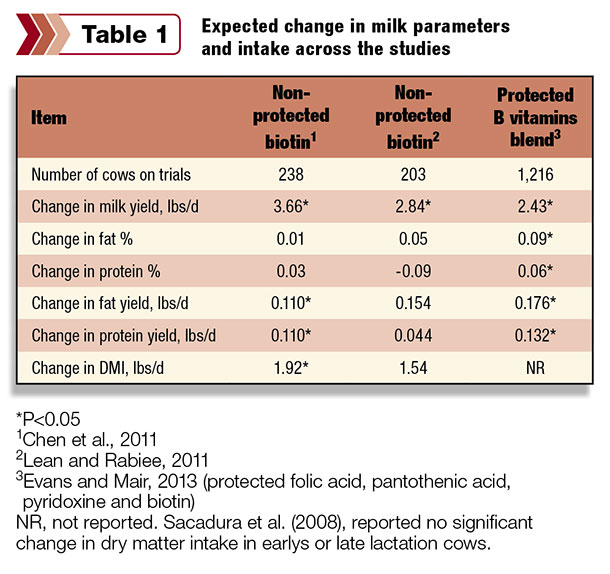B vitamin supplementation is often not considered in many dairy cow diet formulations. Despite the importance of these nutrients in animal metabolism, it is still believed that their supplementation to ruminants is not required due to adequate supply from the diet and ruminal synthesis.
Nevertheless, when some B vitamins have been supplemented, the health and performance of the cow have been improved.
Biotin is one of the B vitamins that have been studied the most in dairy cows. Although no requirement for biotin has been established yet, when supplemented, biotin is normally fed at a rate of 20 mg per cow per day in an unprotected form.
Approximately half of the added biotin is degraded by rumen microflora, with the other half reaching the intestine for further use by the dairy cow.
When fed during a long period (several months), biotin improves hoof health, which then positively impacts overall health and reproduction. Milk yield was also shown to increase in numerous studies, clearly indicating a role for biotin beyond hoof health.
Likewise, a rumen-protected B vitamins blend has been shown to increase milk production. This protected blend contains biotin along with other B vitamins such as folic acid, pyridoxine and pantothenic acid, and therefore, part of the response might be associated with the biotin in the product.
Additional improvements were observed with the blend of protected B vitamins; this article will show these results and compare them with those obtained with the supplementation of non-protected biotin alone.
Two meta-analyses have been conducted in which milk yield, component percentage and component yield were evaluated when biotin alone was provided to lactating dairy cows.
As well, a recent analysis was conducted to evaluate trial results in which lactating cows were supplemented with a protected B vitamins blend (folic acid, pyridoxine, pantothenic acid and biotin).
For unprotected biotin alone, research noted a significant increase in milk volume with the inclusion of 20 mg per cow per day in the ration (Table 1). The composition of the milk did not change when biotin was included in the ration.
 One group of researchers in 2011 reported an improvement in component yield, while others only found a tendency for fat yield to be higher. Thus, it would appear that biotin’s greatest effect is to increase milk volume while maintaining component percentages.
One group of researchers in 2011 reported an improvement in component yield, while others only found a tendency for fat yield to be higher. Thus, it would appear that biotin’s greatest effect is to increase milk volume while maintaining component percentages.
In addition, both sets of researchers found that biotin increased dry matter intake, leaving the question of whether biotin effect on productive performance is driven exclusively by an increased feed intake or an improvement in efficiency is also involved. In any case, the cost of the additional dry matter intake should be taken into account when adding biotin alone in the ration.
The analysis conducted with the protected B vitamins blend (pantothenic acid, pyridoxine, biotin and folic acid) was based on results from 1,216 cows in 12 experiments.
In all cases, trials were conducted as double-reversal switchback trials in which the test product was supplied in the center period at a rate of 3 g per cow per day. Studies in which cows received biotin during the control periods were not included in the dataset.
Researchers in 2013 observed significant increases in milk yield, milkfat and protein percentages, along with an increase in components yield with the inclusion of the protected B vitamins blend in the diet. Dry matter intake was not measured in any of the studies used in the analysis.
However, researchers in 2008 found that dry matter intake did not increase with the inclusion of the same protected B vitamins blend, while milk production and milk components yield increased in early lactation cows, leading to an improved feed and energetic efficiency.
These results coincide with experiments that have found improved feed efficiency of dairy cows when biotin has been supplemented along with other B vitamins in the diet. It seems that biotin utilization is increased by the supplementation of other B vitamins.
As a whole, all of this evidence invites veterinarians, nutritionists and dairy producers to reconsider the assumption that dietary and ruminal supply of B vitamins is sufficient for optimizing cow performance, and that their supplementation might be beneficial.
B vitamins facilitate different metabolic processes that are closely related between them. In order to enhance cow metabolic efficiency, a combined supplementation of B vitamins seems to be more effective than when biotin is supplemented alone, possibly due to a synergetic effect.
The dietary supplementation of biotin alone increases milk yield and dry matter intake, while a blend of rumen-protected B vitamins (folic acid, pantothenic acid, pyridoxine and biotin) increases milk yield but also milk components without any increase in dry matter intake, leading to improved feed efficiency.
Dairy producers and consultants have access to an innovative tool to further improve dairy cow performance and farm income. PD
Rodrigo Molano provides ruminant technical support for Latin America with Jefo Nutrition Inc. Hélène Leclerc offers technical support and R&D for Jefo Nutrition Inc. Essi Evans is with Technical Advisory Services Inc.
References omitted due to space but are available upon request. Click here to email an editor.

-
Hélène Leclerc
- Technical Support and R&D – Ruminant Nutrition
- Jefo
- Email Hélène Leclerc






